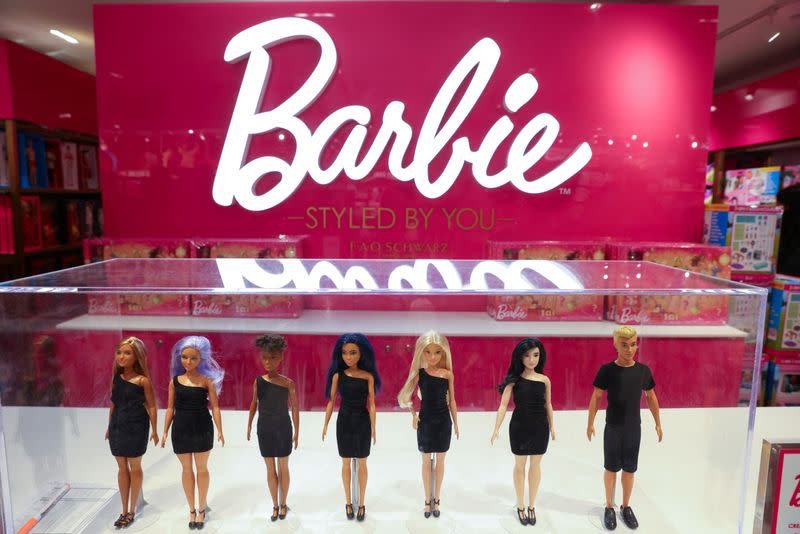'Barbie' movie revives interest in doll collectors' market
By Rachel Nostrant and Julia Harte
(Reuters) - Matthew Keith bought his first Barbie dolls in the 1970s using his allowance money, hiding them from his parents for fear they would say the toys were not masculine enough.
Today, 22 feet of bookshelves in his Los Angeles home are filled with his Barbie collection, worth around $20,000. The middle school teacher's Instagram account, "DollsOnTheBrain," has more than 70,000 followers - about 15,000 of whom he picked up in the last few weeks.
What used to be an arcane hobby has become far more popular recently, fueled by the advertising campaign and audience anticipation around this weekend's film release of "Barbie." At thrift stores, vintage Barbie dolls have become a treasured find, prices in the collectibles market have soared, and antiques appraisers have been flooded by calls from new collectors.
Keith, 55, welcomes the enthusiasm.
"I am both happy and hopeful that this will move the needle on Barbie acceptance for everyone," he said in an interview, adding there are still many little boys who feel pressured not to play with the dolls.
The "Barbie" movie, which opened Friday, is expected to rake in $100 million in U.S. theaters on its opening weekend. Retailers around the world are also hoping to profit off its hype with Barbie-themed offerings from hotel suites to toothbrushes and apparel.
Not all longtime collectors of the iconic doll are as delighted as Keith by the recent interest in Barbie collecting. On a Reddit forum devoted to the pasttime, some complained they were being priced out by wealthy new buyers, due to a spike in interest that surged in the lead-up to the movie.
"I've largely stopped collecting dolls themselves and invest in clothing and accessories instead," wrote one user. "What started out as an affordable hobby has grown too expensive to maintain."

Florida-based veteran Barbie doll dealer Marl Davidson said prices have climbed about 25% in recent months. Her site, MarlBe.com, has been receiving about 3,000 daily hits, triple the usual, many of whom are from people starting collections.
"I've never seen this kind of interest. It's really bringing a lot of new adults into the Barbie-collecting world," Davidson said.
Collector dolls are usually around $100, while non-collector dolls typically range from $10-$30. The so-called "Holy Grail" Barbie, the first model produced in 1959, sells for thousands of dollars.
Dr. Lori Verderame, an art historian and TV personality with 25 years of experience as an antiques appraiser, said the Barbie doll owners who usually seek her expertise are seasoned collectors assessing the insurance value of their trove.
But the movie has generated a roughly 60% increase in demand for Barbie appraisals in the past month, beating out other brands of dolls that are usually more popular, according to Verderame.
"Barbie appraisals don't normally come the way they've been coming," she said. "I've seen some very rare and wonderful dolls for appraisals that we might not have seen if it wasn't for the movie."
Many of those have come from people with little or no experience in doll collecting, such as a person who purchased a Barbie at a thrift store that turned out to be valued at more than $10,000. Another found a doll that had been sitting in her mother's house for years, which turned out to be worth $8,500.
Verderame said many valuable Barbies are "still out there to be found on the treasure hunt in thrift stores," but added that the current spike in seller interest is only likely to last about two more weeks.
Keith, the Los Angeles collector, has never paid more than $230 for a Barbie doll, but he said many of the dolls in his collection have appreciated in value since he bought them.
"I feel like Barbie has elevated my personal finances, even though I've put a lot of money into her since 1991," he said.
(Reporting by Julia Harte and Rachel Nostrant; editing by Paul Thomasch and Aurora Ellis)
